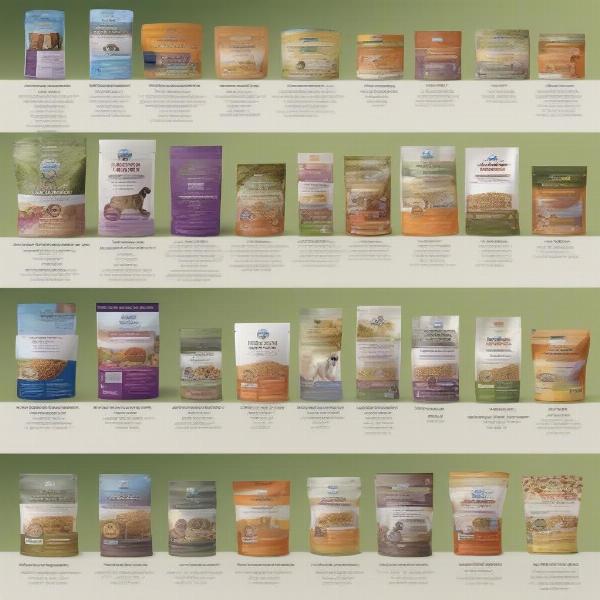Choosing the right dog food can be overwhelming, especially with so many options labeled “advanced” or “premium.” This advance dog food review aims to simplify the process, offering practical advice and key factors to consider so you can confidently select the best nutrition for your furry friend. Understanding your dog’s individual needs, reading labels carefully, and knowing what to look for in high-quality ingredients are all crucial steps in making an informed decision.
Decoding the “Advanced” Dog Food Label
What does “advanced” even mean when it comes to dog food? Often, it signals a focus on specific dietary needs or life stages. This could include formulations for sensitive stomachs, joint health, weight management, or senior dogs. However, the term isn’t regulated, meaning it’s crucial to look beyond marketing claims and delve into the ingredient list.
Key Nutrients to Look For in an Advanced Formula
A truly advanced dog food should prioritize high-quality protein sources, like chicken, fish, or lamb. These provide the building blocks for strong muscles, healthy skin, and a shiny coat. Look for whole grains or complex carbohydrates like sweet potato and brown rice for sustained energy. Healthy fats, such as omega-3 and omega-6 fatty acids, are essential for brain function, skin health, and a glossy coat.
Considering Your Dog’s Individual Needs
Just like humans, every dog has unique dietary requirements. Age, breed, activity level, and any existing health conditions should all influence your food choice. For instance, a highly active working dog needs more calories and protein than a senior dog with limited mobility. Puppies require specific nutrients to support growth and development. Always consult your veterinarian for personalized recommendations, especially if your dog has allergies or specific health concerns.
Is Grain-Free Always Better?
While grain-free diets can be beneficial for some dogs with allergies, they’re not inherently superior. In fact, recent studies have raised concerns about a potential link between grain-free diets and heart disease in some breeds. dog food for diabetic dogs This highlights the importance of discussing dietary changes with your vet before making a switch.
Reading the Fine Print: Understanding Dog Food Labels
Understanding dog food labels is essential in making the right choice. Look for the AAFCO (Association of American Feed Control Officials) statement, which verifies that the food meets minimum nutritional requirements. Pay close attention to the guaranteed analysis, which lists the minimum percentages of crude protein, fat, fiber, and moisture. The ingredient list, ordered by weight, reveals the primary components of the food. Avoid foods with artificial colors, flavors, and preservatives.
How do I transition my dog to a new food?
Switching dog food abruptly can cause digestive upset. dog treats for dogs Gradually introduce the new food over 7-10 days, mixing increasing amounts with the old food until the transition is complete. Monitor your dog for any signs of digestive issues, such as vomiting or diarrhea.
Advance Dog Food for Specific Needs
Many advanced dog foods cater to specific health concerns. For example, formulas for joint health often contain glucosamine and chondroitin to support cartilage. Weight management formulas are typically lower in calories and fat while higher in fiber to promote satiety. diabetic dog food treats Senior dog foods may contain added antioxidants and joint support ingredients.
 Advanced Dog Food for Specific Needs
Advanced Dog Food for Specific Needs
Conclusion: Making the Best Choice for Your Dog
Choosing an advanced dog food requires careful consideration of your dog’s individual needs, understanding ingredient labels, and seeking professional advice when necessary. Prioritizing high-quality ingredients, avoiding artificial additives, and gradually transitioning to a new food are crucial steps in ensuring your canine companion receives the optimal nutrition for a long and healthy life. This advance dog food review provides you with the knowledge to confidently navigate the options and make the best choice for your furry friend.
FAQ
- What is the difference between “advanced” dog food and regular dog food? Advanced formulas often target specific needs like joint health or weight management, utilizing specialized ingredients and higher quality protein sources.
- How much should I feed my dog? Feeding guidelines are usually printed on the food bag, but individual needs vary. Consult your vet for personalized recommendations.
- Can I give my dog treats while feeding them an advanced diet? Yes, but choose healthy treats and factor them into your dog’s daily caloric intake. dog treats for diabetic dogs
- What are the signs of a food allergy in dogs? Itching, skin redness, digestive upset, and ear infections can be signs of a food allergy. Consult your veterinarian for diagnosis and treatment.
- Is raw food a good option for my dog? While raw diets are gaining popularity, they come with potential risks. Discuss the pros and cons with your vet before switching.
- How often should I change my dog’s food? As long as your dog is thriving on a particular food, there’s no need to change it frequently. However, dietary needs can change over time, so regular vet checkups are essential.
- What if my dog doesn’t like the new advanced food I’ve chosen? Gradually transitioning to the new food can help. You can also try adding a small amount of warm water or low-sodium broth to enhance palatability. sweet potato and turkey dog food
ILM Dog is a leading international online resource dedicated to providing expert advice and practical tips for dog owners worldwide. We cover a wide range of topics, from breed selection and puppy care to senior dog health and training techniques. Whether you’re a seasoned dog owner or just starting out, ILM Dog offers reliable information to help you provide the best possible care for your canine companion. We specialize in breed selection, health and medical care, training and behavior, nutrition, and product recommendations. Contact us at [email protected] or +44 20-3965-8624 for personalized advice. We’re here to help you navigate every stage of your dog’s life!